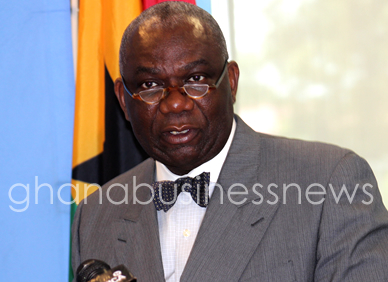Over $50b needed for petroleum hub agenda – Agyarko

Mr Boakye Agyarko, the Energy Minister, has said over $50 billion investment funds would be needed to build a relevant petroleum infrastructure such as an oil refinery, tank farms, pipelines, marine facilities and other allied facilities to make Ghana a petroleum hub.
He said the estimated amount was reached after the assessment made by a petroleum task force inaugurated by the government last year to develop a petroleum infrastructure master plan and road map towards the realisation of the vision.
He said the funds was supposed to come from public and private investments of which the government was to raise 10 per cent to support the construction of road networks, electricity and water facilities,
Mr Agyarko made this known at the second edition of the Ghana International Petroleum Conference in Accra held on the theme: ‘‘Realising the vision of a petroleum hub’’.
The four-day event was under the auspices of the Energy Ministry and Ghana Chamber of Bulk Oil Distributors, in collaboration with the National Petroleum Authority and the Association of Oil Marketing Companies.
It brought together key stakeholders in the petroleum downstream sector, including policy-makers, regulators and oil service providers, to deliberate on policies and trends in the sector, as well as discuss pertinent issues affecting the industry in the bid to guide decision-making.
The participants are expected to come out with some recommendations to help resolve challenges in the petroleum downstream and chart the way forward.
Mr Agyarko said the theme for the conference was in tandem with the government’s vision, which was enshrined in the new National Energy Policy.
To that end, he said, the Ministry would work diligently to achieve the vision of the government, adding that, the petroleum task force had visited some countries that had made headway in petroleum infrastructure.
Therefore the task force consequently engaged key stakeholders and prospective investors in the petroleum industry on the way forward.
Mr Agyarko said upon extensive consultation and assessment by the task force, government was convinced that the nation had the capacity of developing petroleum infrastructure into a hub in the sub-region.
He, therefore, urged the petroleum service providers to upgrade their skills and business capacity to partner with the Foreign Direct Investors to ensure a fair balance and significant value retention of benefits in the country.
‘‘Today, financing for new refineries has become difficult to obtain, especially as some existing refineries across the world are being shut down due to low margins.
‘‘But I believe with the right strategies and value positioning, coupled with the right environment, investors will choose Ghana and partner with us to develop infrastructure such as refinery, tank farms, pipelines, marine facilities, expanding our export capabilities and other allied facilities required to make our hub a reality,’’ Mr Boakye stated.
The Energy Minister gave the assurance that the government would provide favourable fiscal environment and incentives to attract the right investment into the petroleum downstream industry.
He expressed optimism that the intended petroleum hub would compete favourably with other trading centres across the world, which would increase government’s revenues to accelerate economic growth.
Mr Agyarko said government agreed with the call for the review of some of the country’s petroleum laws that governed downstream petroleum sector such as the National Petroleum Act, Act 691.
He said the government had approved the Local Content and Participation Policy for the petroleum downstream, which would ensure Ghanaian participation was consolidated without compromising the country’s desire to attract Foreign Direct Investment.
He said henceforth, new entrants into the downstream petroleum industry, particularly oil marketing companies that supply petroleum products to the market and other industries, including mining, extraction and aviation industries, were required to be Ghanaian firms that owned a minimum of 51 per cent equity, while existing operators with foreign participation have up to 10 years to meet the requirement.
The Energy Minister noted that the International Maritime Organisation had lowered the sulphur content cap of petroleum products from 3.5 to 0.1 per cent, which required that the existing petroleum infrastructure were supposed to upgrade their facilities, in order to achieve the new specification and make the products safer.
Mr Agyarko said the Ministry had prepared a draft Fuel Quality Policy, which provides guidance on acceptable sulphur specifications and would go through stakeholders’ consultations for their inputs before going to the Cabinet for consideration and approval.
Meanwhile, he said, the National Petroleum Authority had implemented guidelines on Fuel Quality Specifications, which put the sulphur levels of petroleum products at 50ppm (part per million).
He said industry players were complying with the guidelines to ensure safer and healthy environment for the people.
In the light of those development, Mr Agyarko urged the African Refinery Association and the ECOWAS Secretariat to urgently move towards achieving the needed harmonisation of fuel quality specifications in the sub-region and Africa as a whole.
Mr Alhassan Tampuli, the Chief Executive Officer of the National Petroleum Authority, on his part said, the stable political environment in the country would enable the country to achieve a competitive petroleum infrastructure.
He however, he called for a downward review of some import tariffs and improvement in the port infrastructure to make Ghana competitive in the petroleum downstream sector and achieve the vision of becoming a petroleum hub in the sub-region.
Source: GNA
